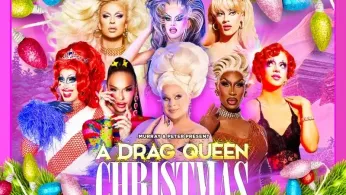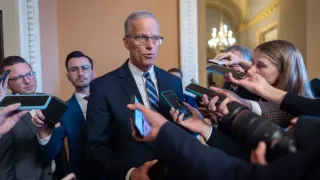
4 hours ago
Florida’s “Demonic” Drag Drama: Pensacola’s Christmas Show Sparks Outrage, Resilience, and Queer Joy
READ TIME: 3 MIN.
In what has quickly become a flashpoint for queer resistance and creative defiance, Florida attorney general James Uthmeier this week demanded the cancellation of a Christmas drag show in Pensacola—despite the event being strictly for adults and having broken no laws. Uthmeier branded the show “demonic” and insisted it would “harm children,” even though, by all legal and promotional accounts, kids aren’t even permitted past the velvet rope .
This isn’t just another headline in the ongoing saga of “Drag Under Siege.” It’s Exhibit A in the culture war’s holiday edition, where tinsel and sequins meet state-level censorship and queer community organizing.
The show in question—a festive drag extravaganza produced by a local LGBTQ+ collective—was designed as a safe space for queer adults to celebrate the season with camp, comedy, and unapologetic joy. Promotional materials highlighted the event’s age restriction and commitment to community, making the attorney general’s claims of child endangerment not only inaccurate but also impossible .
Yet, in a letter to the Pensacola City Council, Uthmeier called for immediate cancellation, warning of “demonic influences” and public harm. He conceded, however, that no laws had been broken—admitting there was no legal basis for action, but arguing for cancellation on moral grounds .
Queer communities are no strangers to being labeled as threats, but the “demonic” accusation adds a surreal twist—one that feels ripped straight from a ’90s tabloid rather than a modern legal office. Drag performers, organizers, and fans have responded with a mix of humor and outrage, pointing out the irony of calling a Christmas show that celebrates love and inclusion “evil.” As one local performer quipped on social media, “If campy Christmas drag is demonic, then honey, pass the pitchforks—we’re bringing the heat!”
The invocation of “demonic” language is more than rhetoric; it’s a dog whistle to a broader campaign to restrict LGBTQ+ visibility and artistic expression in public spaces. For many in the queer community, these attacks feel less about protecting children and more about policing joy, self-expression, and belonging—especially during a season that’s supposed to be about goodwill and togetherness.
Local LGBTQ+ organizations and allies have rallied behind the show, organizing solidarity events and flooding social media with messages of support and defiance. The controversy has spurred new conversations about the importance of queer spaces—especially in regions where LGBTQ+ rights are under legislative attack.
Drag, after all, isn’t just about lip-syncs and laughter; it’s a centuries-old art form rooted in resistance, satire, and the celebration of identity. In Pensacola, the Christmas drag show has become a microcosm of the broader fight for queer visibility and creative freedom. “Our holiday drag tradition is about joy, not harm,” says one organizer. “We deserve the right to gather, to express ourselves, and to celebrate—without being branded as villains” .
The attorney general’s intervention is part of a larger pattern in Florida and beyond, where drag events are increasingly targeted under the guise of protecting children—even when those events are explicitly for adults . These efforts have chilling effects: venues may self-censor, performers face harassment, and queer audiences lose vital spaces to connect and find joy.
But the response in Pensacola shows the power of collective action and queer resilience. The drag show organizers, undeterred, are moving forward with the event, inviting allies to join and reminding the public that LGBTQ+ communities have always thrived through adversity—transforming attacks into opportunities for visibility and solidarity.
As the holidays approach, the Pensacola drag show stands as a glittering beacon for those who celebrate difference and resist stigma. The event’s defenders argue that queer joy is not just permissible—it’s essential. In the words of one longtime attendee, “Drag saved my holidays. It’s where I found chosen family, laughter, and a sense of belonging. Attempts to shut us down don’t make us disappear; they make us louder, prouder, and more united” .
Ultimately, the battle over Pensacola’s Christmas drag show isn’t just about one night or one city. It’s about who gets to define community, artistry, and morality—and whether queer people can gather in public to celebrate their lives without fear. For now, the answer from Florida’s LGBTQ+ community is clear: the show must go on.






